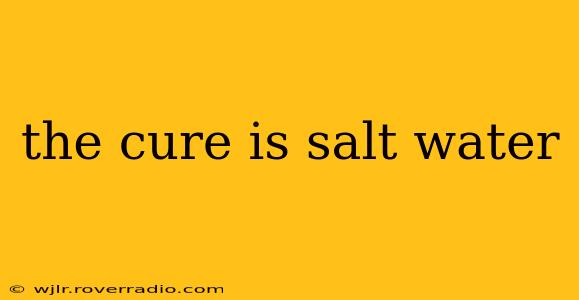The Cure is Salt Water: Separating Fact from Fiction in Traditional Remedies
The idea that "the cure is salt water" is a common phrase often associated with traditional remedies and anecdotal evidence. While saltwater has legitimate uses in certain medical contexts, it's crucial to understand that it's not a cure-all and should not replace professional medical advice. This article will explore the various uses of saltwater, its limitations, and the importance of consulting healthcare professionals for any health concerns.
What are the purported benefits of saltwater?
Saltwater, specifically a saline solution (a mixture of salt and water with a specific concentration), has been used for centuries for various purposes. Its purported benefits often stem from its ability to:
-
Cleanse wounds: Saltwater's antimicrobial properties can help clean minor wounds and prevent infection. The salt draws out fluid and helps remove debris, creating a cleaner environment for healing. However, this is only effective for superficial wounds and should not be used for deep, puncture, or severely infected wounds.
-
Soothe sore throats: Gargling with warm saltwater can temporarily alleviate sore throat pain by reducing inflammation and potentially killing some bacteria. However, it's not a long-term solution and should be accompanied by other appropriate treatments if the sore throat persists.
-
Flush nasal passages: A saline nasal rinse can help clear nasal congestion caused by allergies, colds, or sinusitis. This helps to remove mucus and irritants, improving breathing. However, improper technique can lead to infections, so proper instruction is essential.
-
Treat some skin conditions: Diluted saltwater solutions can help soothe some skin irritations, such as minor burns or rashes. However, it's not effective for all skin conditions, and some may even worsen with saltwater exposure.
Is saltwater a cure for any diseases?
No. The idea that saltwater is a cure for any disease is a dangerous misconception. There is no scientific evidence supporting this claim. Saltwater's benefits are limited to specific, localized uses as described above. Serious illnesses require professional medical diagnosis and treatment, not home remedies. Relying solely on saltwater for treating serious conditions can be detrimental to one's health and may even delay appropriate medical care.
What are the risks associated with using saltwater?
While generally safe when used properly and in appropriate concentrations, saltwater can pose risks if misused:
- Infection: Using contaminated saltwater or improper wound care techniques can lead to infection.
- Dehydration: Drinking large quantities of saltwater can be harmful and lead to dehydration.
- Electrolyte imbalance: Excessive salt intake can disrupt the body's electrolyte balance, potentially leading to serious health problems.
- Irritation: Saltwater can irritate sensitive skin or mucous membranes if not diluted properly.
How should I use saltwater safely?
If using saltwater for home remedies, it's crucial to:
- Use sterile water: Use distilled or sterile water to avoid introducing bacteria.
- Follow proper dilution instructions: Concentrations should be appropriate for the intended use. Too much salt can be harmful.
- Consult a healthcare professional: Always seek medical advice for any health concerns before relying on home remedies.
What are the best treatments for common ailments?
The best treatments for common ailments vary depending on the condition. Always consult a healthcare professional for diagnosis and treatment. Self-treating can be dangerous and delay proper care.
This article is for informational purposes only and does not constitute medical advice. Always consult a qualified healthcare professional for diagnosis and treatment of any medical condition. The information provided here should not be interpreted as a replacement for professional medical guidance.
